Which Side Are You On? November 12, 2016
|
|
|
First BRM Bangalore Intensive Buddhist English Course
Mahabodhi Society
November 28 - December 23, 2016
|
|
Preparations are nearly complete
120 Novice students - 8 Teachers
80 Hours of instruction
|
|
| Would you like to make a contribution to help cover the cost of meals for the novices and teaching materials?
All donations, big or small, will be appreciated and will be very useful.
|
|
|
|
 |
|
|
All donations are IRS tax-exempt
and will be duly receipted.
|
|
|
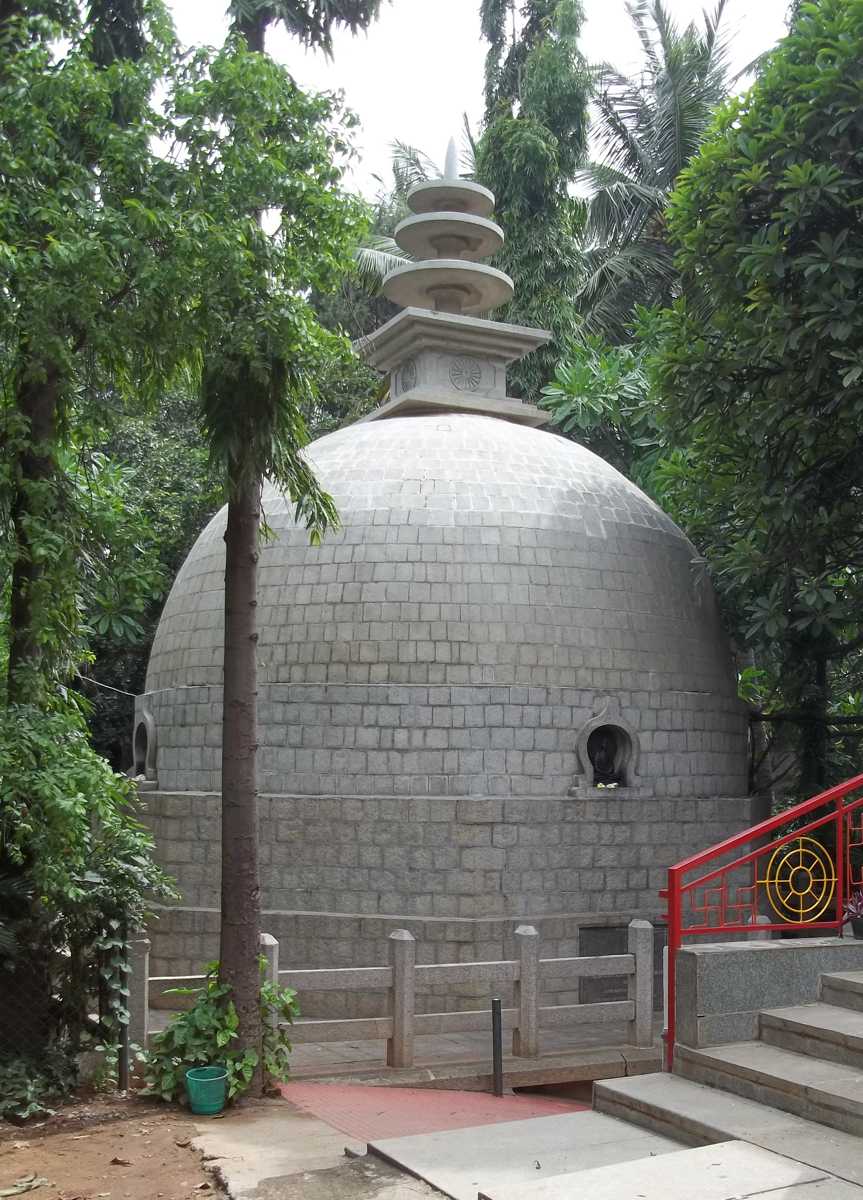 |
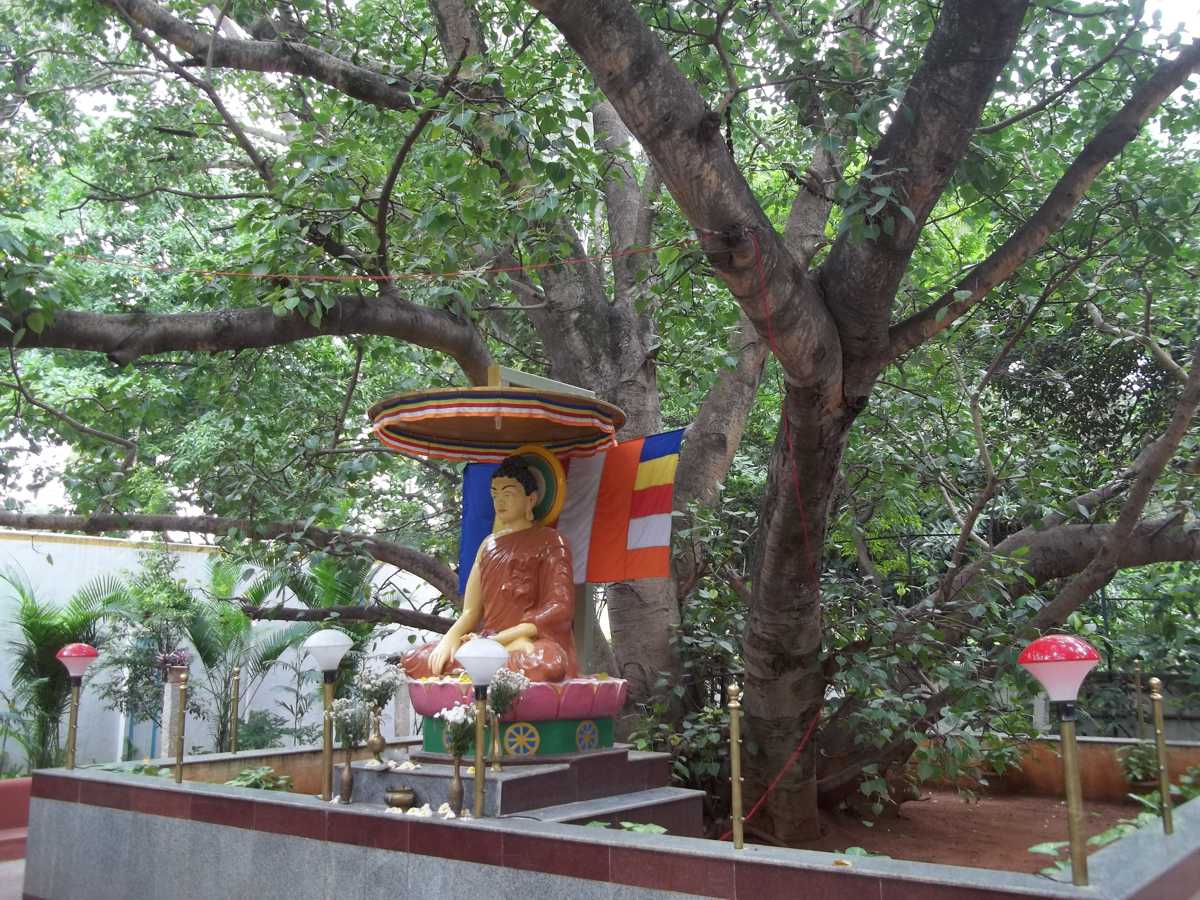 |
|
|
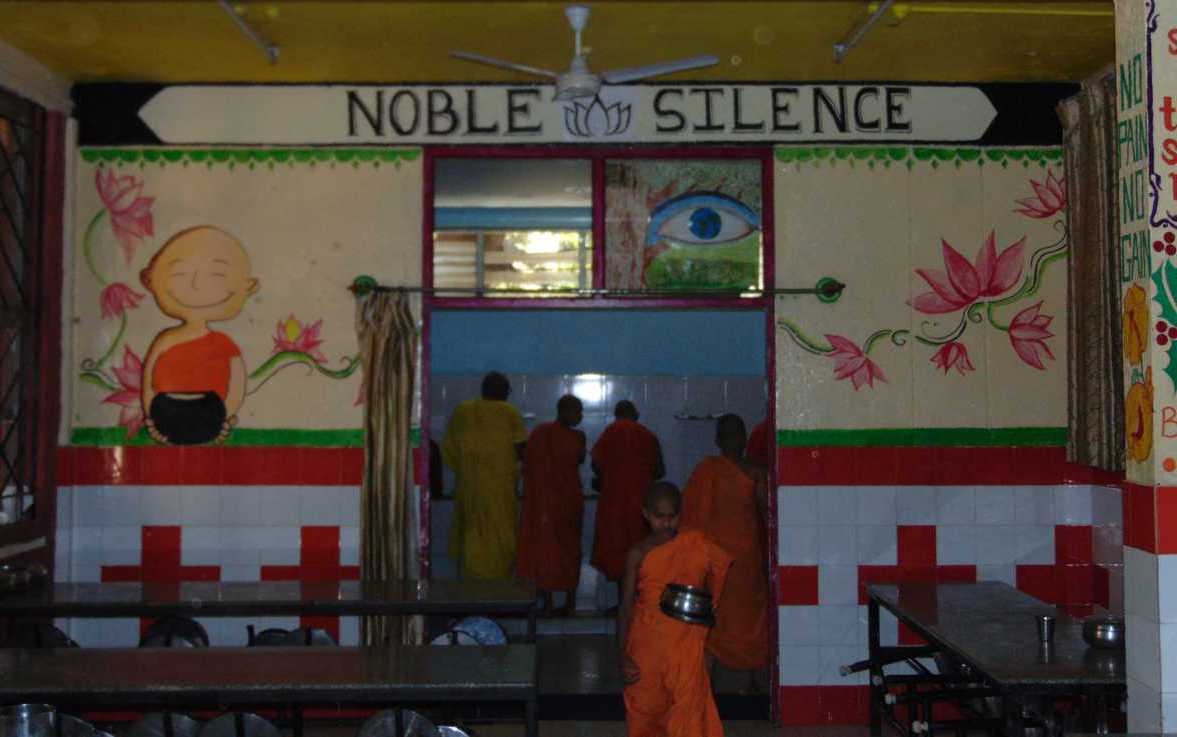 |
|
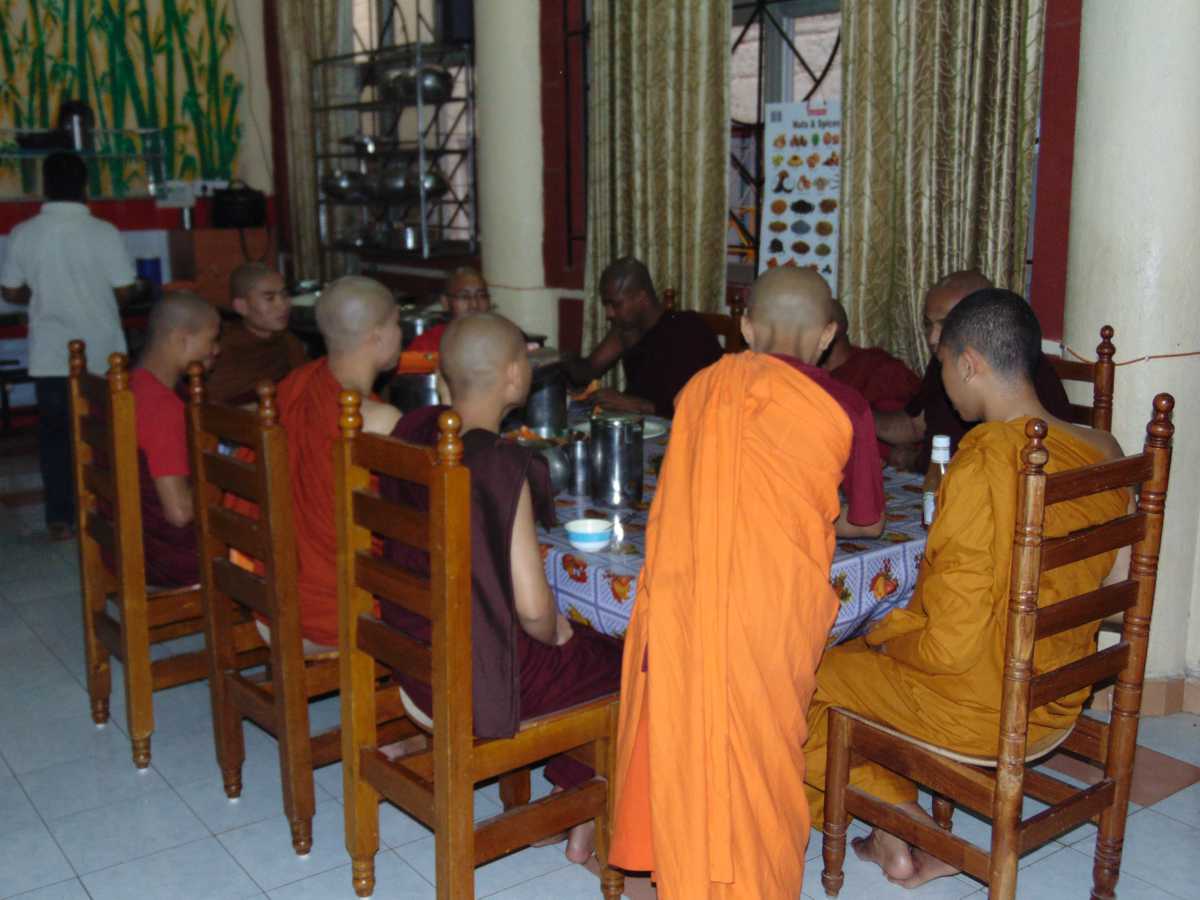 |
|
|
|
|
|
|
|
|
|
|
|
Everywhere we turn, we find issues that offer clear choices and virtually demand that we take sides. To be consistent, we need to stand with those water protectors trying to stop the pipeline in North Dakota. We need to show solidarity with the besieged peoples of Palestine, Syria, Yemen, Iraq, Somalia, Afghanistan, and Pakistan. We need to speak out on behalf of the refugees fleeing war and terror and seeking asylum in other lands. We need to advocate for the Rohingyas, the Kachin, the Karen, the Shan. We need to side with nature against Monsanto. We need to proclaim loudly that Black Lives Matter and to oppose racism and white supremacy. We need to stand up for those who are discriminated against--gays, lesbians, bi-sexual and transgender people, Muslims, Sikhs, atheists, the poor, and the homeless. We need to oppose the commodification of everything and respect working people. We need to demand that potable water and clean air are fundamental rights. We need to fight those who would limit health care and education to those who can pay. We need to oppose the death penalty and to support inmates' strikes against prison slavery and for-profit incarceration. We need to defend forests, rivers, jungles, and oceans. We need to protect wildlife of all sorts and to strive to live more simply and kindly. We need to be ready to declare which side we are on!
We should make choices which are wholesome, moral, and blameless. The way in which we stand up for what is right, however, is crucial. We must be skillful, kind, generous, well-intentioned, and non-violent. The end, no matter how noble, can never justify unwholesome or harmful means.
In these toxic times, we need to read both widely and critically, to listen carefully, to fact check what we hear and read, and to engage in discussion whenever possible and always honestly. We need to understand the danger of emotions, the compulsion that arises from fear, the addiction of hatred, the craving for self-preservation, and the ease of believing in attractive lies.
 Recently, in our class of monks and nuns at Subodharama, we read the Dhammapada story we call "Revenge" relating how jealousy drove a barren first wife to poison her pregnant rival, who herself vowed revenge in the next life. That cycle of revenge continued from life to life until the Buddha gently intervened and reconciled them with the teaching:
Recently, in our class of monks and nuns at Subodharama, we read the Dhammapada story we call "Revenge" relating how jealousy drove a barren first wife to poison her pregnant rival, who herself vowed revenge in the next life. That cycle of revenge continued from life to life until the Buddha gently intervened and reconciled them with the teaching:
Hatred is never appeased by hatred.
Only by non-hatred can hatred be appeased.
This is a universal law.
--Dhammapada 5 |
|
|
|
As the Presidential campaign ended, we were dismayed to realize that neither candidate seriously discussed the environment, which continues to deteriorate alarmingly. We've had spells of flooding, drought, and now heavy rains yet again. In many places in the world, nature is under assault, and agriculture is in disarray. There are predictions of failing crops and declining fish stocks. As always, the poorest among us are the most threatened, yet politics these days seemed only to distract, so that noone would notice what a terrible year it has been for our beleaguered earth and its inhabitants. 2016 is set to become the hottest year on record! Did anyone mention global warming! Climate catastrophe?!
We must remember that the cause of all conflict is greed, hatred, and delusion. It is against these defilements, however they manifest themselves, that we must take a stand.
Wars, declared or undeclared, have broken out to the extent that it is difficult even for the well-informed to be able to know who is bombing or threatening to destroy whom. In fact, according to the Global Peace Index, there are, at present, only ten countries which can be declared entirely peaceful!
With such a proliferation of misery, the only one thriving, fattening, and being satisfied is the Anger-eating Demon who feeds on hatred, conflict, and harsh speech. This story from the suttas we also read in class. Please pay careful attention to how Sakka, king of the gods, manages to deflate that demon!
If there is hope for the world, it lies in understanding, patience, and universal compassion.
After we had read "Revenge," some didn't seem throughly convinced that revenge was never justified, because it seems so natural. We turned our attention to Maha-Silava Jataka, "Not One Drop of Blood." King Maha-Silava, thoroughly committed to observing the first precept, merely exiled a guilty minister instead of having him executed. Even though that minister, in seeking revenge, encouraged a neighboring king to attack Maha-Silava's wealthy kingdom, the king, remaining steadfast in his resolve, refused to defend his throne, declaring that not one drop of blood should be shed in his name. Relying on his remarkable patience, his unwavering determination, and the power of loving-kindness, King Maha-Silava prevailed and regained his throne, with his former rival swearing friendship. When one student suggested that King Maha-Silava's entering the usuper's chamber was a kind of revenge, we discussed whether pure harmlessness was even practical. Mention was made of Mugapakkha Jataka which presents a clear picture of the dangers inherent in ruling a nation. As a baby sitting in his father's lap, Crown Prince Temiya saw the king meting out punishment on some alleged miscreants. Realizing that, in a previous life, dispensing justice had sent him to hell, the little Bodhisatta resolved that he would not to grow up to be king. He immediately began pretending to be a deaf and mute imbecile. Despite all attempts by his parents to lure or frighten him from his non-responsiveness, his determination did not waver. At last, released from his responsibility to rule, he revealed his strength and wisdom and became an ascetic.
To better explore the issues of morality, power, conflict, and non-harming, we decided to read Ven. Thanissaro's essay, "Getting the Message," hoping to clarify the Buddha's teaching on non-violence. The discussions have been lively and thought-provoking. Our students have given their opinions and questions and listened to each other carefully. We are so lucky to have these good kalyana-mitta with whom we exchange language and Dhamma teachings.
As Buddhists, we have the first precept:
|
|
|
I undertake the training rule to abstain from the taking of life.
|
|
|
|
|
|
|
This is the foremost rule for living a proper human life. In addition to keeping one's own morality pure, the promise not to kill grants to other beings freedom from fear. The Buddha pointed out that, on the other hand, merely brandishing a weapon creates danger and fear. It follows that merely having weapons leads to the conditions for war. One step in the Noble Eightfold Path is that the manufacture of and trade in weapons and poison is wrong livelihood. It follows that the purchase and use of those weapons is abetting wrong livelihood.
The Buddha stated clearly that, in a violent conflict, no one wins. In the case of war, both the victor and the defeated suffer alike.
|
Victory breeds enmity,
The defeated one sleeps badly.
The peaceful one sleeps at ease,
Having abandoned both victory and defeat.
A man will go on plundering
So long as it serves his ends,
But, when others plunder him,
The plunderer is plundered.
|
|
|
|
The fool thinks fortune is on his side
So long as his evil does not ripen,
But, when the evil ripens,
The fool incurs suffering.
The killer brings forth a killer,
The conqueror, a conqueror.
The abuser, an abuser,
And the reviler, a reviler.
Thus, by the unfolding of kamma
The plunderer is plundered.
-- Samyutta Nikaya 3, 14-15
|
|
|
|
|
|
History has proven that invariably, one war sets the stage for the next.
In these days of unnamed fears, terrorism, wars without end, and state terrorism, we must agree with Ven. Thanissaro:
|
...the delusions surrounding our fears promote unskillful actions: we react to genuine dangers in ways that, instead of ending the dangers, actually create new ones. We amass wealth to provide security, but wealth creates a high profile that excites jealousy in others. We build walls to keep out dangerous people, but those walls become our prisons. We stockpile weapons, but they can easily be turned against us.
The most unskillful response to fear is when, perceiving dangers to our own life or property, we believe that we can gain strength and security by destroying the lives and property of others. The delusion pervading our fear makes us lose perspective. If other people were to act in this way, we would know they were wrong. But somehow, when we feel threatened, our standards change, our perspective warps, so that wrong seems right as long as we're the ones doing it.
This is probably the most disconcerting human weakness of all: our inability to trust ourselves to do the right thing when the chips are down. If standards of right and wrong are meaningful only when we find them convenient, they have no real meaning at all.
"Freedom From Fear," by Thanissaro Bhikkhu
|
|
|
|

The bathroom for the master bedroom boasts a huge mirror that covers the entire wall above the sink. Recently we noticed a steady stream of tiny black ants disappearing behind the mirror. We liberally sprayed the clove-scented, natural local repellent along the line of march, and this seemed to deter the ants. They quickly regrouped, however, changed course, and found a new route to get behind the mirror.
We had had the same problem with ants behind the smaller mirrors in the other bathrooms, and had replaced the plywood panels behind them. We asked Ashoka to investigate this case, pointing out that the mirror was so heavy that he needed make sure Nimal was available--it was a two-man job! The next day, they set to work. No sooner had they touched the mirror than they discovered that it was on the point of falling. The plywood panel had so rotted from moisture and the ants that the four screws were dangerously loose. It was a marvel that the mirror had not already come crashing down, seriously injuring man, woman, or animal who happened to be standing there at the time. Of course, we use that sink everyday, and Nezumi often begs to have the faucet turned on for her to lap the running water. As it was, Ashoka and Nimal removed the mirror, without incident, scraped off ants' eggs, scrubbed the entire surface to remove grime, replaced the plywood with a new slab, and rehung the mirror. It is once more up, safe, and ant-free. We have to be grateful to the ants for alerting us to the danger before anyone was hurt!
In our last report, we wrote about collecting rainwater for our vegetables. Shortly after that report was posted, the rain stopped. Our tank remained empty, and we realized that planting new seeds was risky. Sri Lanka experienced such a severe drought that farmers in Polonnaruwa were burning their ricefields. There was a shortage of electricity, and some cities announced water cuts several days a week. Kurunegala was hit particularly hard. We heard that the well which Ven. Amilasiri dug last year had dried up and that he had to purchase bowsers (truckloads) of water for several weeks. This was a tremendous expense for the monastery.
 Recently, however, the rains began again. Unfortunately, the land had dried out so much that the rain created new landslides. The trainline between Kandy and Colombo was cut, and the trains stopped for two days. A picture in the newspaper showed the track hanging in mid-air for a stretch of about twenty feet. The earth beneath the track had completely washed away. Since this was on a hillside, we wondered how the repair was done. Woven bamboo as we had seen once on the border in Thailand? Two hundred-foot-tall pylons from the valley floor? It boggles the mind!
Recently, however, the rains began again. Unfortunately, the land had dried out so much that the rain created new landslides. The trainline between Kandy and Colombo was cut, and the trains stopped for two days. A picture in the newspaper showed the track hanging in mid-air for a stretch of about twenty feet. The earth beneath the track had completely washed away. Since this was on a hillside, we wondered how the repair was done. Woven bamboo as we had seen once on the border in Thailand? Two hundred-foot-tall pylons from the valley floor? It boggles the mind!
As the year draws to an end, the United Nations' World Meteorological Organization has already declared it the hottest year on record. According to NASA, "Each of the first six months of 2016 set a record as the warmest respective month globally in the modern temperature record, which dates to 1880."
The fact is that there is no longer any "normal" pattern for weather. Everything is going to be abnormal and extreme. How long can mankind survive under these conditions?
 In September, we took part in the annual dana that our friend and neighbor Veena gives for her husband's death anniversary. It is Veena's daughter whose factory produced the porcelain image of the Buddha that we sent to Calvin and his Buddhist group in the prison last year. At the dana we spoke with a woman who is the president of Kandy Senior Citizens. The group meets at the Kandy Club above the lake twice a month on a Tuesday morning. The next meeting was going to be the following Tuesday. She invited us to attend, and we decided to give it a try.
In September, we took part in the annual dana that our friend and neighbor Veena gives for her husband's death anniversary. It is Veena's daughter whose factory produced the porcelain image of the Buddha that we sent to Calvin and his Buddhist group in the prison last year. At the dana we spoke with a woman who is the president of Kandy Senior Citizens. The group meets at the Kandy Club above the lake twice a month on a Tuesday morning. The next meeting was going to be the following Tuesday. She invited us to attend, and we decided to give it a try.
Going through town on a Tuesday morning involves lots of traffic jams, because everything has to go all the way around the lake. (Why the road in front of the Maligawa continues to be closed is beyond us. The argument that it would be disrespectful to have trucks with alcohol and animals for slaughter doesn't make a lot of sense. The closure certainly generates a great deal of pollution from the slow-moving buses, trucks, cars, and three-wheelers which have to go ten times further around the lake to get out of town.
Ashoka cleverly took us via a hilly road around town. It's perhaps a little longer, but much more pleasant. At the top of the hill we came upon a fruit stand. We were delighted to see that the seller had pineapples on display. (We had refrained from buying a pineapple at the supermarket when we saw that the price was four hundred rupees. Normally, a good-sized pineapple is only about one hundred sixty rupees. Lily had reported that, because of the drought, the fruit had even disappeared from the pineapple market village on the way to Colombo.) The pineapples on the hilltop were only two hundred rupees each, so we bought one. It was, admittedly, a bit small, but it made the morning's fruit salad so much better!
The meeting was quite enjoyable. The president welcomed us and asked us to introduce ourselves. The members are, for the most part, retired teachers, doctors, civil servants, and the like. They get together regularly to socialize, to keep themselves informed and involved, and to have fun. The group collects money for several charities, especially the Kandy Hospital. We learned that their last fund drive came out 7000 rupees short, so we were able to donate the balance. Each meeting has a theme. That day's program was water. A local organization was explaining the importance, the need, and the diminishing availability of fresh water around the world. They had offered to test water for the members, and many had brought small bottles of their own tap water to assess the quality of what they were drinking. We hadn't taken a sample, and we were not able to stay for the full meeting, so we don't know what conclusions were made. We are, nonetheless, satisfied with the Unilever filter we are using, and, according to the claim that came with it, we don't have to boil our water anymore.
The second meeting was devoted to humorous sketches. Members were invited to tell jokes or present mini-dramas to the group. The presentations were imaginative and entertaining. One was even a bit risque. Ken was tempted to do "Bad Rabbit," but he refrained from making a spectacle of himself. Perhaps next year!
We were not able to join the group's outing to visit the stupa at Kotmale, but we attended the next meeting. Each session begins with singing the national anthem and reading a pledge to be kind and good senior citizens, which is really lovely. This was a planning meeting for the pre-Christmas sale, an annual event of the group, which will take place, sadly, the day after we leave for India. Not having a white elephant on hand, we were happy to donate one copy of each of our books. We also donated a bathtub support that we had used in the States, but for which we have no need here, not having a bathtub. Perhaps someone else will find it as useful as we did eleven years ago. We have also agreed to sell one hundred raffle tickets. At only thirty rupees each, that should be a piece of cake, or, as the Japanese say, "Asameshi mae" (Done before breakfast)!
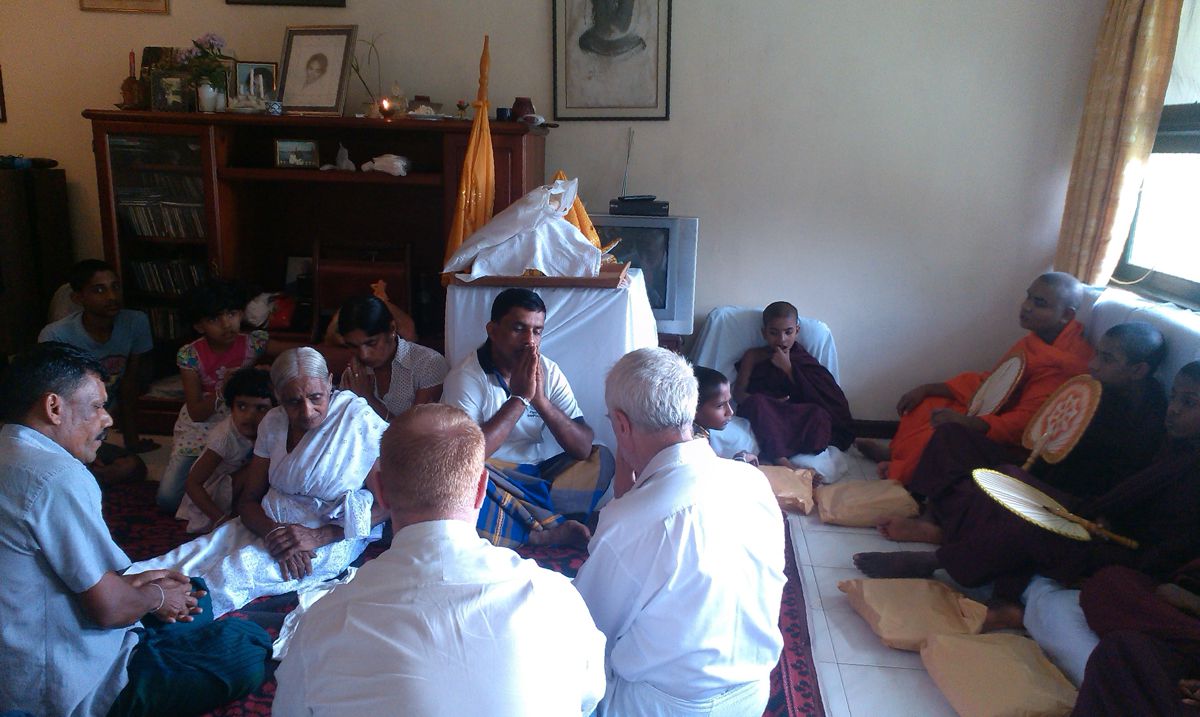 In September, Ewen invited us to the dana he had arranged on the anniversary of his wife's death. It took place shortly after his son and daughter-in-law, Ben and Lynn, had arrived from China. Ben is teaching at the British Council, and the couple have found a house very near us here in Anniwatte. We are fortunate to be able to see them frequently.
In September, Ewen invited us to the dana he had arranged on the anniversary of his wife's death. It took place shortly after his son and daughter-in-law, Ben and Lynn, had arrived from China. Ben is teaching at the British Council, and the couple have found a house very near us here in Anniwatte. We are fortunate to be able to see them frequently.
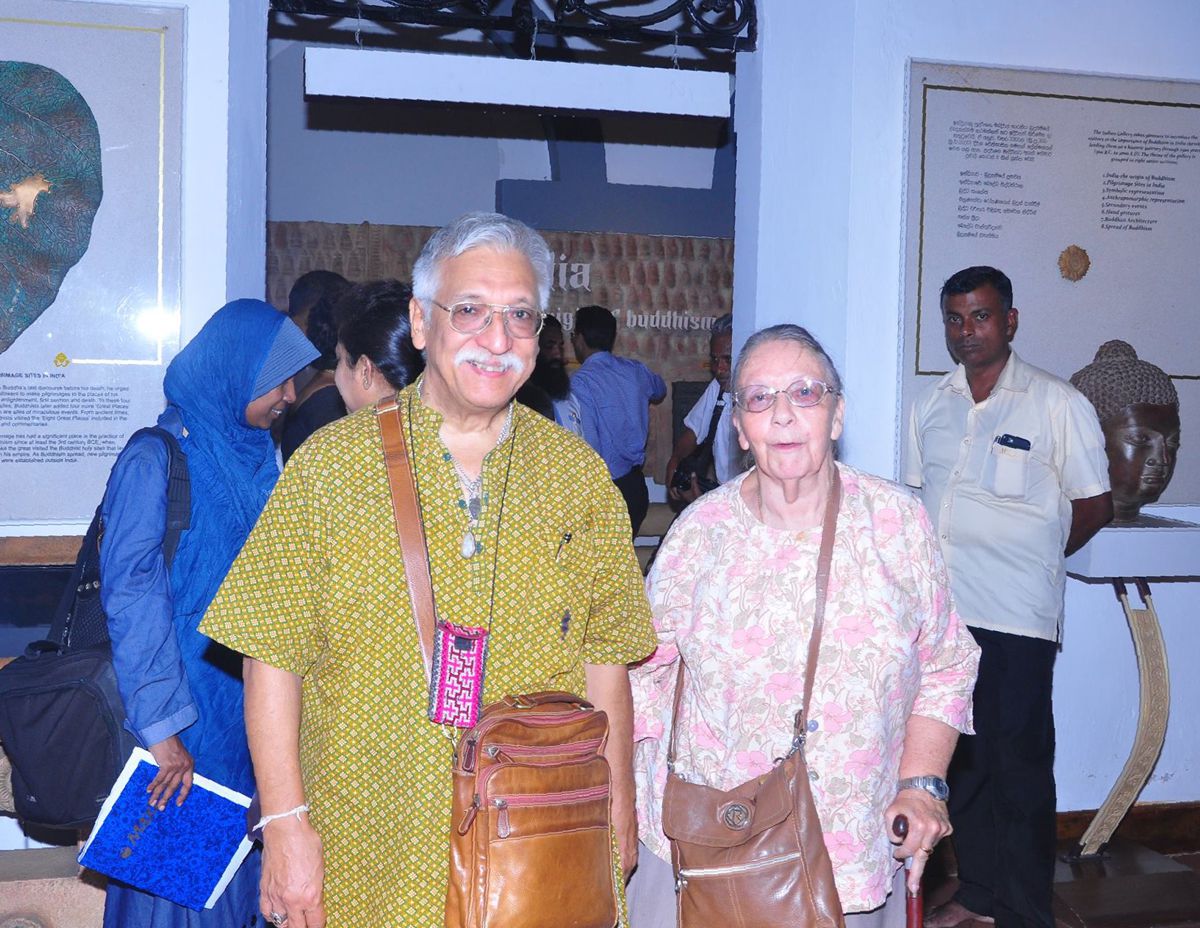 Thanks to Amal, we learned about a program organized by the Assistant High Commission of India, Kandy, and to be held in the India room of the splendid International Buddhist Museum, situated behind the Maligawa. We have visited the museum several times, but we had never seen the India Room, for it was completed only recently. We were excited to join the meeting, which turned out to be a celebration to mark the 125th birth anniversary of Dr. Ambedkar. We arrived at the museum early and had a chance to admire the display which is very impressive. There are reproductions and photographs of almost all of the important icons of Indian Buddhist history, art, and architecture. Right on schedule (rare in Sri Lanka!) The Assistant High Commissioner and other dignitaries formally garlanded a portrait of Dr. Ambedkar. Then, without further ado, everyone ambled to the adjoining and very comfortable auditorium for the presentations. The Assistant High Commissioner gave a brief welcome and explanation of the event. Then there were three keynote speakers, one each in English, Sinhala, and Tamil. All were brief, lively, and, obviously interesting to those who could understand (also rare in Sri Lanka!). The Tamil portion was delivered by a lovely Muslim PhD student at University of Peradeniya named Lareena. We couldn't understand her speech, but the Assistant High Commissioner had wisely arranged for the salient points to be translated in a PowerPoint presentation and projected onto the screen at the front of the auditorium. Lareena described Dr. Ambedkar's efforts for women's empowerment and his commitment to women's rights in India. Afterwards, we had a chance to talk over refreshments and learned that Lareena, mother of two, is also an accomplished singer-song-writer.
Thanks to Amal, we learned about a program organized by the Assistant High Commission of India, Kandy, and to be held in the India room of the splendid International Buddhist Museum, situated behind the Maligawa. We have visited the museum several times, but we had never seen the India Room, for it was completed only recently. We were excited to join the meeting, which turned out to be a celebration to mark the 125th birth anniversary of Dr. Ambedkar. We arrived at the museum early and had a chance to admire the display which is very impressive. There are reproductions and photographs of almost all of the important icons of Indian Buddhist history, art, and architecture. Right on schedule (rare in Sri Lanka!) The Assistant High Commissioner and other dignitaries formally garlanded a portrait of Dr. Ambedkar. Then, without further ado, everyone ambled to the adjoining and very comfortable auditorium for the presentations. The Assistant High Commissioner gave a brief welcome and explanation of the event. Then there were three keynote speakers, one each in English, Sinhala, and Tamil. All were brief, lively, and, obviously interesting to those who could understand (also rare in Sri Lanka!). The Tamil portion was delivered by a lovely Muslim PhD student at University of Peradeniya named Lareena. We couldn't understand her speech, but the Assistant High Commissioner had wisely arranged for the salient points to be translated in a PowerPoint presentation and projected onto the screen at the front of the auditorium. Lareena described Dr. Ambedkar's efforts for women's empowerment and his commitment to women's rights in India. Afterwards, we had a chance to talk over refreshments and learned that Lareena, mother of two, is also an accomplished singer-song-writer.
 The more we learn about the life and work of Dr. Bhimrao Ramji Ambedkar (April 14, 1891 - December 6, 1956), the more we understand why he is regarded as a Bodhisattva. A brilliant student, jurist, economist, politician and social reformer, he chaired the drafting committee of the Constituent Assembly and was India's first Minister for Law and Justice. He campaigned against social discrimination based on caste and actively supported the rights of minorities and labor. In 1956, he converted to Buddhism and continues to inspire the Dalit Buddhist Movement. Following his example, every year, millions of Dalits take refuge in the Triple Gem.
The more we learn about the life and work of Dr. Bhimrao Ramji Ambedkar (April 14, 1891 - December 6, 1956), the more we understand why he is regarded as a Bodhisattva. A brilliant student, jurist, economist, politician and social reformer, he chaired the drafting committee of the Constituent Assembly and was India's first Minister for Law and Justice. He campaigned against social discrimination based on caste and actively supported the rights of minorities and labor. In 1956, he converted to Buddhism and continues to inspire the Dalit Buddhist Movement. Following his example, every year, millions of Dalits take refuge in the Triple Gem.
We have learned a great deal about Dr. Ambedkar from Ven. Prajnasheel, the Indian monk from Maharashtra, whom we first met in Bangalore in 2001. He joined our pilgrimage in 2001-02, and we toured Maharashtra with him in 2006. On that tour we participated in the celebration in Nagpur of the 50th anniversary of Dr. Ambedkar's conversion, which took place on October 14, 1956, and in which half a million Dalits took refuge in the Triple Gem.
 |
|
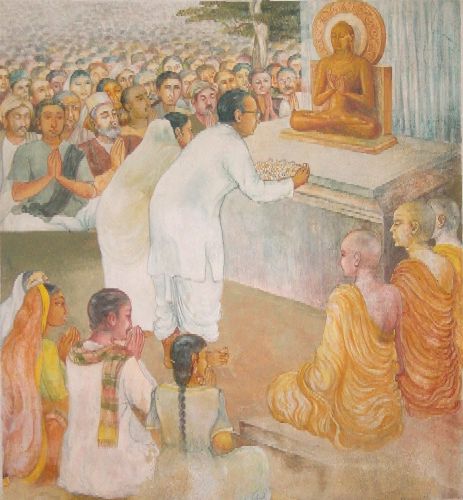 |
A
painting
in the
Sri
Lankan
Vihara
in
Savatthi
of the
ceremony
in 1956 |
|
|
October 2, 2006, Deekshabhumi, Nagpur, where Dr. Ambedkar converted in 1956.
|
|
|
|
|
|
|
|
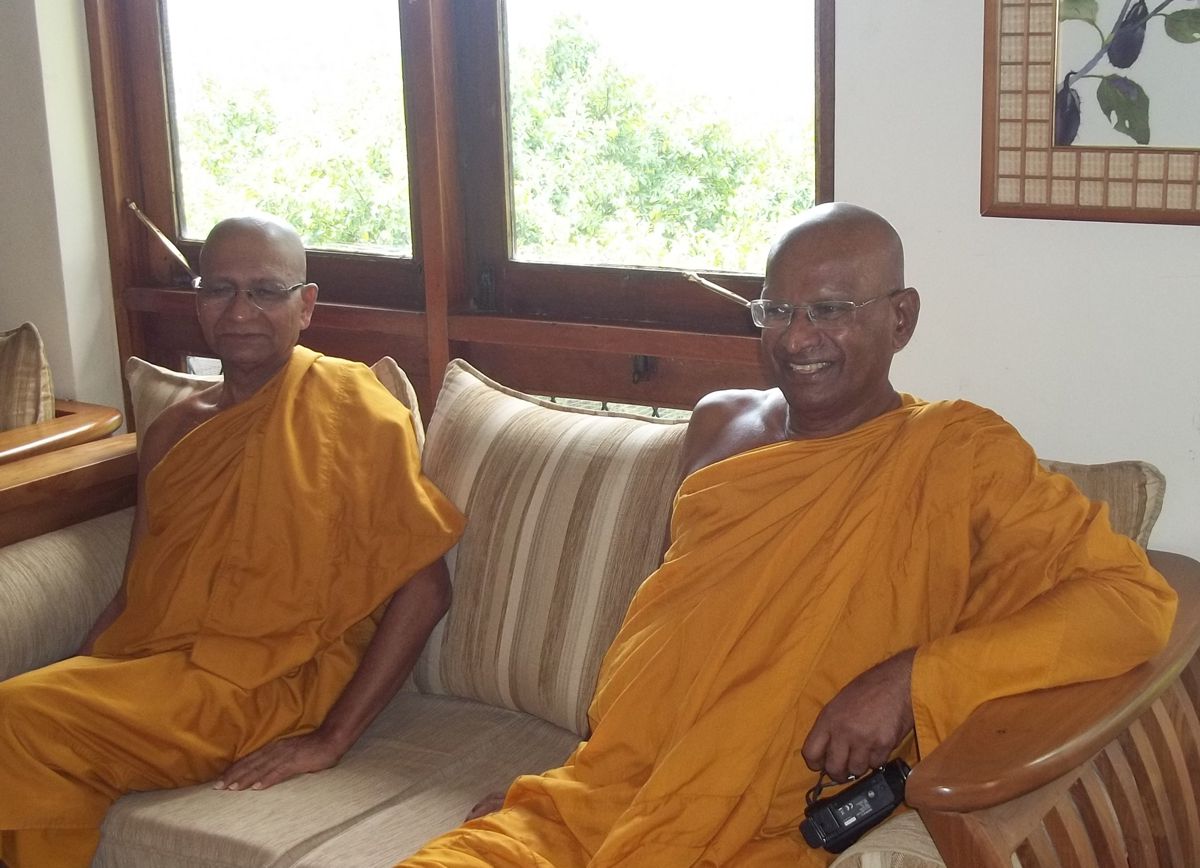 |
|
| Click the photo to see more photos of dana at our house. |
|
|
|
Inviting members of the Sangha to our house is always a pleasure. Ven. Upatissa often comes from Ja-Ela, and we are happy to have Ven. Nirodha come across town whenever she can. Recently, Amal brought two Indian monks who had been meditating with him at Kanduboda. Interestingly, we had previously met both of them in India, one at his school in Nagpur and the other in Aurangabad before he had ordained.
 |
|
| Click the photo to see more photos of birthday celebrations. |
|
|
|
August, September, and October are popular birthday months in our household. This year we celebrated the anniversaries of the birth of Ken, Visakha, Mike, Lily, Shehan, and Surangi. It meant a lot of dana, cake, and fun.
 |
|
| Click the photo to see more photos of the dana at Bodhirukarama |
|
|
|
As part of the celebration of Shehan's birthday, we arranged to take dana to Ven. Amilasiri and the elderly monks at Bodhirukarama in Kurunegala. Unfortunately, Shehan wasn't able to go with us. It was, as always, an enjoyable day, and we were joined by another family from Colombo, who were visiting the temple for the first time.
 |
|
| Click the photo to see more photos of our guests. |
|
|
|
During these months, this year, we also had several guests who brightened our house and kept us from getting too depressed about the state of the world.
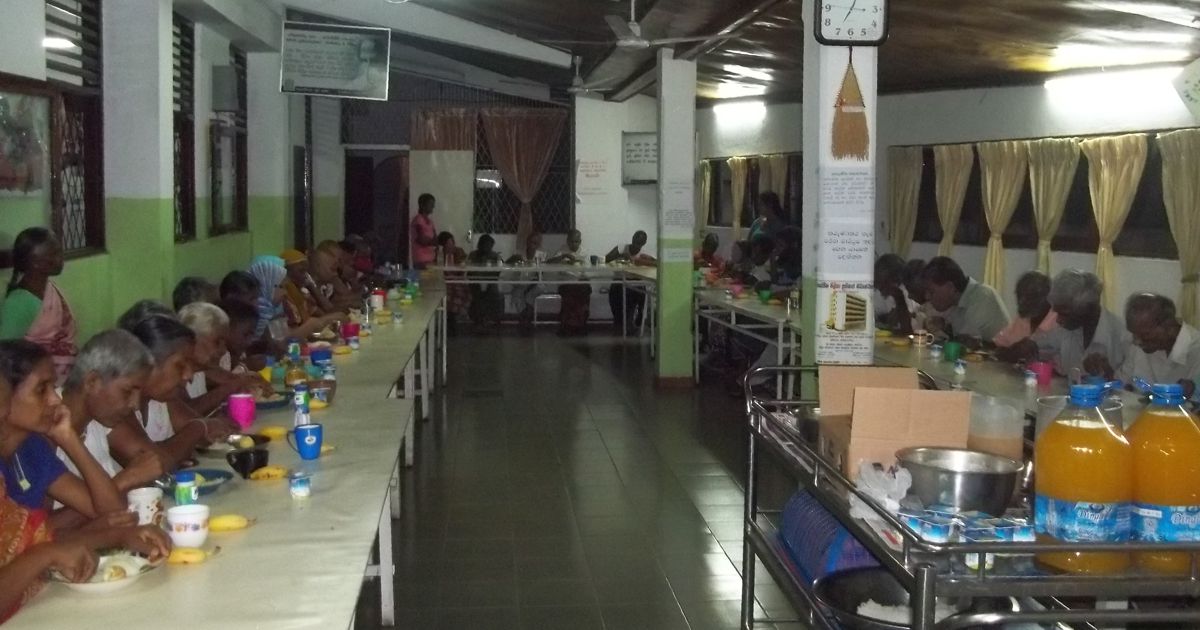 |
|
| Click the photo to see more photos of offering the meal at the Cancer Home |
|
|
|
In October, while Lal and Vivi were here, Lily's family honored the memory of Raja's mother by offering an evening meal at the Kandy Cancer Society Home.
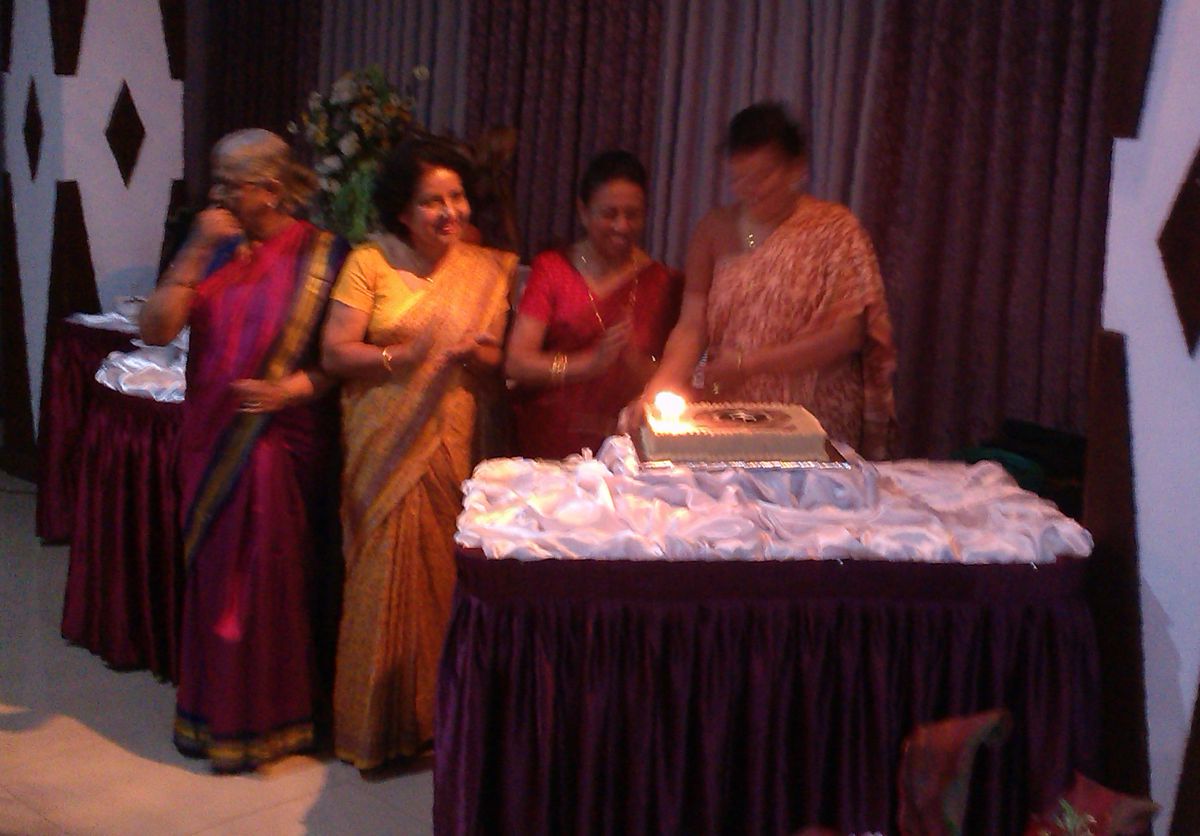 Last month, Lalitha insisted that we mark our calendars for Saturday, November 5. She was inviting us to the 75th Anniversary Meeting of the Sri Lanka Federation of University Women, Kandy. We knew nothing about this organization, and were not sure why we, particularly Ken, were invited. We were, nevertheless, happy to attend, because Lalitha is such a steadfast friend and everything she is involved with is exciting. We perused the schedule and tried to time our arrival after most of the business part of the meeting would be finished, but before the arrival of the special guest, who (we were happy to see) was the Assistant High Commissioner, whom we had met at the meeting mentioned above. We were a little early, and Lalitha (who is Vice-President of the organization) left the head table to greet us warmly, but quietly, and seated us prominently in the front row. At first, we felt a little embarrassed to be there for the official proceedings (Ken was the only man in attendance at that point), but no one seemed to mind. We were amazed at how civilly and succinctly the women carried out their business. In discussions, they listened carefully to each other, and no one tried to dominate with long-winded pontificating. It was a joy to watch the proceedings. One issue that particularly interested us was whether the organization was a branch of the Colombo organization or completely independent. We did not follow completely, but we thought we heard that the organization in Kandy is actually older than the one in Colombo. In that this is the 75th anniversary, we were not surprised. In her presentation to the group, Lalitha pointed out that, if the organization is, indeed, independent, a separate constitution is needed. She cited one article from the Colombo constitution and proposed her own revision, which stipulated that "any dedicated person" be eligible for membership. She glanced at Ken as she read that, and we understood that she hopes that we both will become members. We would be honored!
Last month, Lalitha insisted that we mark our calendars for Saturday, November 5. She was inviting us to the 75th Anniversary Meeting of the Sri Lanka Federation of University Women, Kandy. We knew nothing about this organization, and were not sure why we, particularly Ken, were invited. We were, nevertheless, happy to attend, because Lalitha is such a steadfast friend and everything she is involved with is exciting. We perused the schedule and tried to time our arrival after most of the business part of the meeting would be finished, but before the arrival of the special guest, who (we were happy to see) was the Assistant High Commissioner, whom we had met at the meeting mentioned above. We were a little early, and Lalitha (who is Vice-President of the organization) left the head table to greet us warmly, but quietly, and seated us prominently in the front row. At first, we felt a little embarrassed to be there for the official proceedings (Ken was the only man in attendance at that point), but no one seemed to mind. We were amazed at how civilly and succinctly the women carried out their business. In discussions, they listened carefully to each other, and no one tried to dominate with long-winded pontificating. It was a joy to watch the proceedings. One issue that particularly interested us was whether the organization was a branch of the Colombo organization or completely independent. We did not follow completely, but we thought we heard that the organization in Kandy is actually older than the one in Colombo. In that this is the 75th anniversary, we were not surprised. In her presentation to the group, Lalitha pointed out that, if the organization is, indeed, independent, a separate constitution is needed. She cited one article from the Colombo constitution and proposed her own revision, which stipulated that "any dedicated person" be eligible for membership. She glanced at Ken as she read that, and we understood that she hopes that we both will become members. We would be honored!
One of the projects that Lalitha is involved with under the auspices of the organization is providing supplemental English language instruction to village schools near Kandy. She explained that, in one particular school, she had found a very competent teacher who was particularly receptive to her offer of assistance. Together, they organized a mini drama class for about ten students. Lalitha wrote a short script based on a Sri Lankan folk tale, and the students rehearsed it over a period of several weeks. Then, just as it was to be presented, her husband fell ill, and she had to cancel her visits to the school. The local teacher carried on, and the production was an overwhelming success, even though the students had never before taken part in any form of dramatics, and their English level was very basic. Lalitha suggested that the students be invited to present their play at the women's meeting, and everyone agreed. She was confident that the students would be OK, but she spent a bit of time encouraging them and polishing their performance.
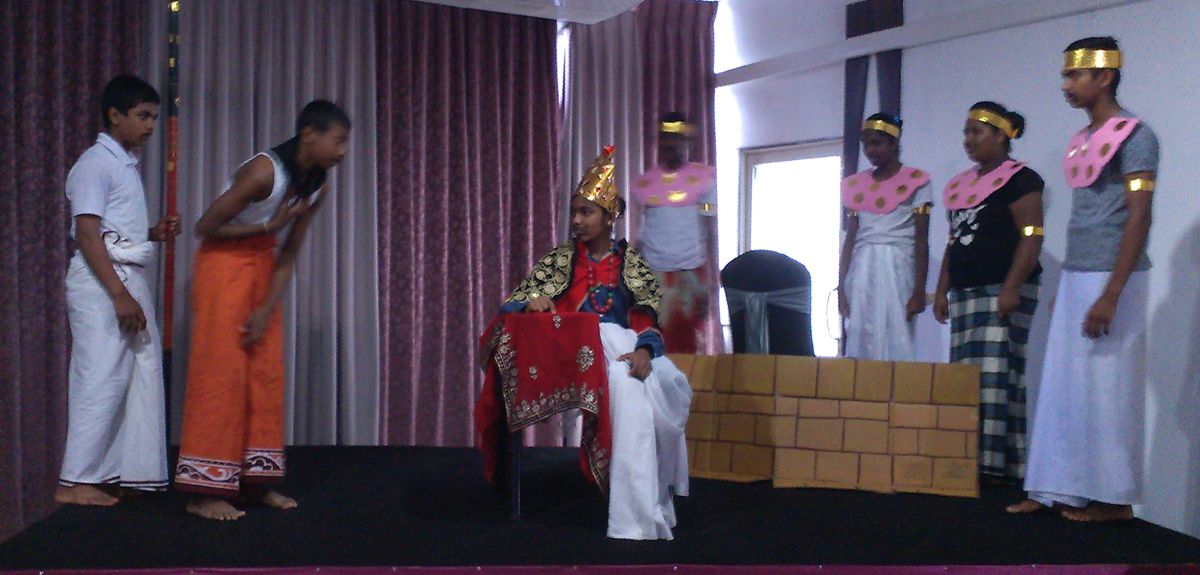 The skit lasted only about ten minutes, but it was marvelous. These were probably only middle-school students, but their poise and self-confidence was astonishing. Every line of the dialog was given with perfect pronunciation and a degree of intonation that most Sri Lankans who have not had an English education can only dream of. Lalitha should have been extremely proud, but she gave all credit to the students and their own teacher. That's the kind of teacher she is!
The skit lasted only about ten minutes, but it was marvelous. These were probably only middle-school students, but their poise and self-confidence was astonishing. Every line of the dialog was given with perfect pronunciation and a degree of intonation that most Sri Lankans who have not had an English education can only dream of. Lalitha should have been extremely proud, but she gave all credit to the students and their own teacher. That's the kind of teacher she is!
The meeting concluded with a delicious lunch. We were able to sit at the same table with the Assistant High Commissioner, and the conversation was stimulating, not only with her, but with several of the members, as well. We felt very welcome and were very glad to have been included.
 On October 6, Lore Kawasaki, the German-born wife of Ken's eldest brother Ed, passed away. She had been bed-ridden for about ten years as the result of a stroke. We visited her and Ed many times while we were living in Japan and before we came to Sri Lanka. She was lively, witty, and a lot of fun. That is how she will always be remembered.
On October 6, Lore Kawasaki, the German-born wife of Ken's eldest brother Ed, passed away. She had been bed-ridden for about ten years as the result of a stroke. We visited her and Ed many times while we were living in Japan and before we came to Sri Lanka. She was lively, witty, and a lot of fun. That is how she will always be remembered.
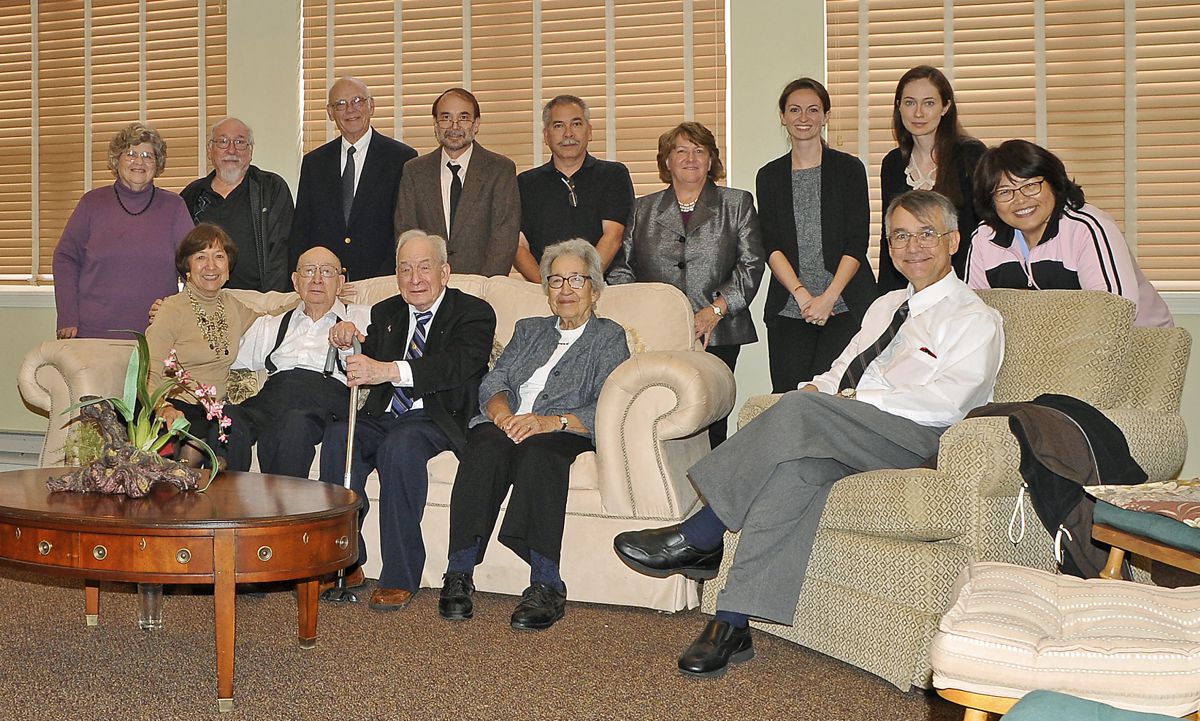 |
|
|
Click the photo to enlarge and read the names, |
|
|
|
|
A memorial service for her was held on October 22. Let us share the note we sent to the family.

 |
|
 |
 |
|
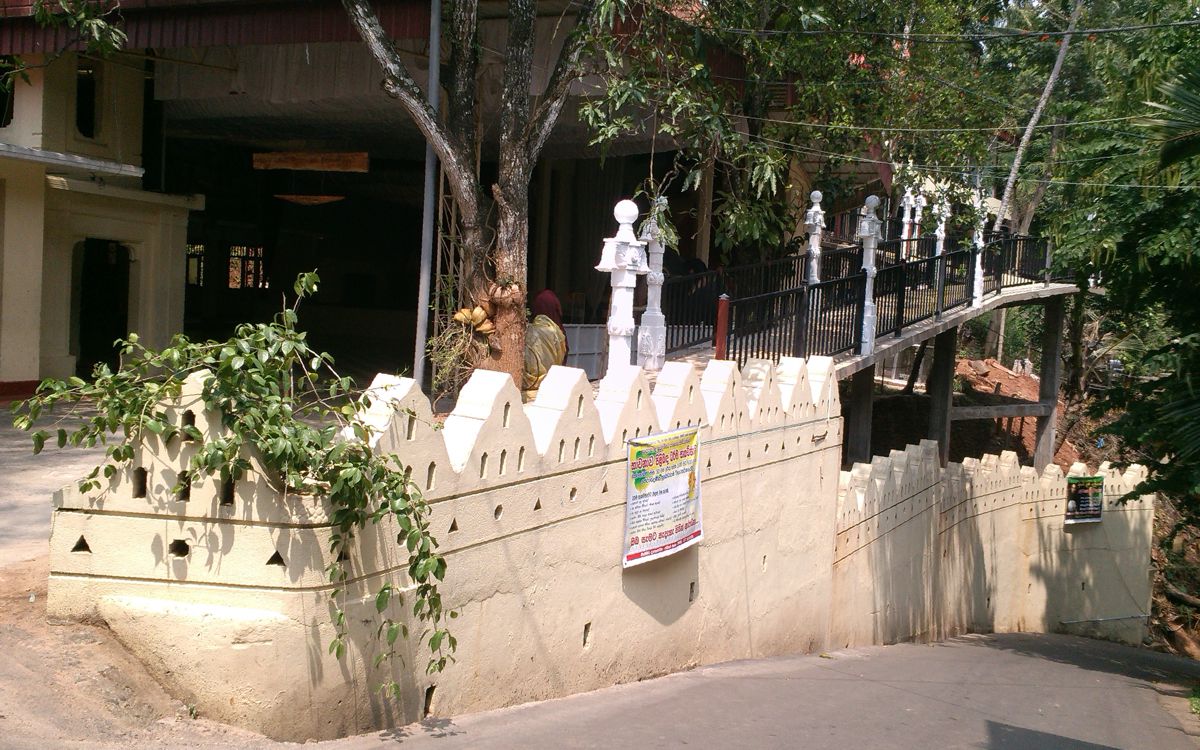 |
|
|
Traffic in Kandy
|
Fishing cat crossing
|
A new ramp at Subodharama
|
|
|
|
|
|
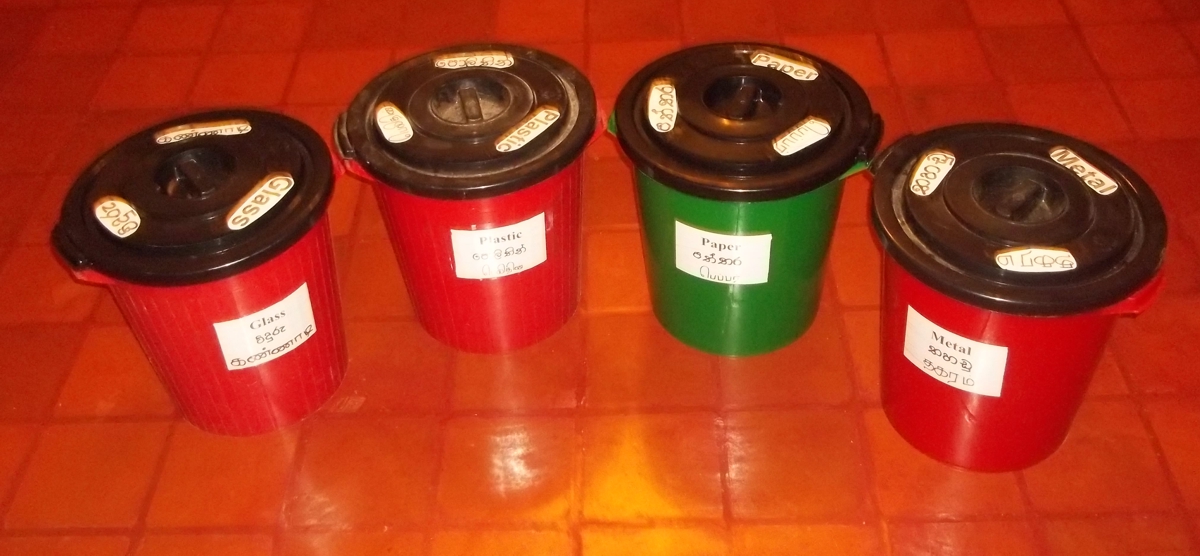 |
|
|
 |
|
|
The first radish from our garden
|
|
 |
|
|
Garbage segregation in Kandy
|
|
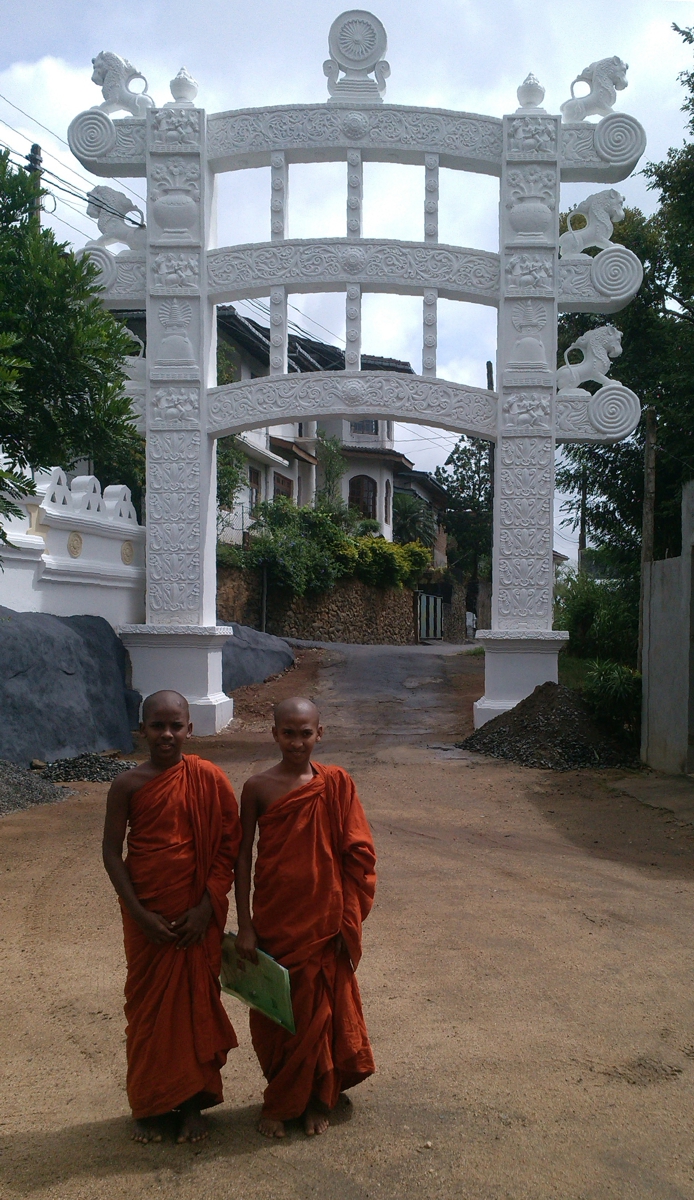 |
|
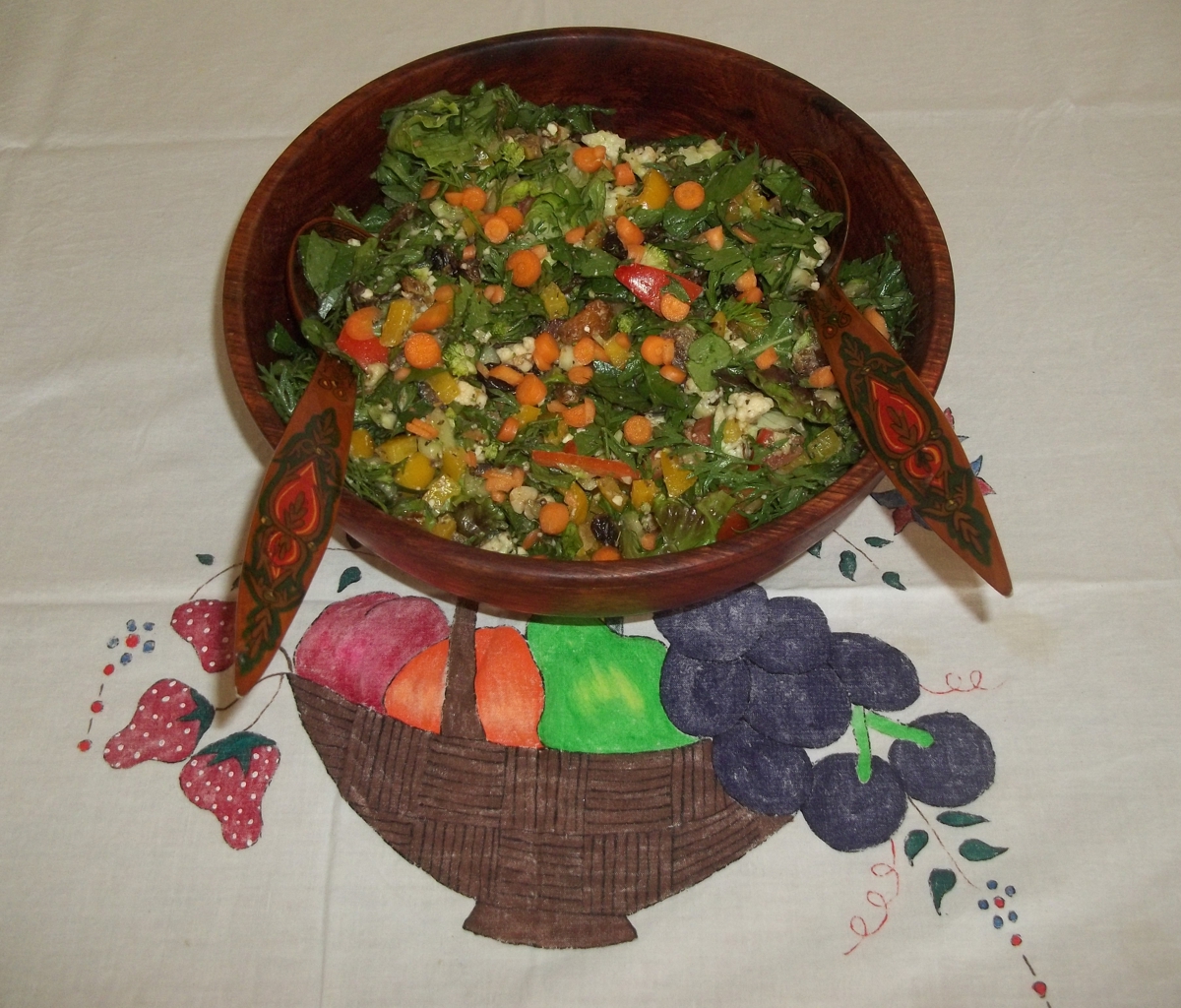 |
|
|
|
Salad with tiny carrots from our garden
|
|
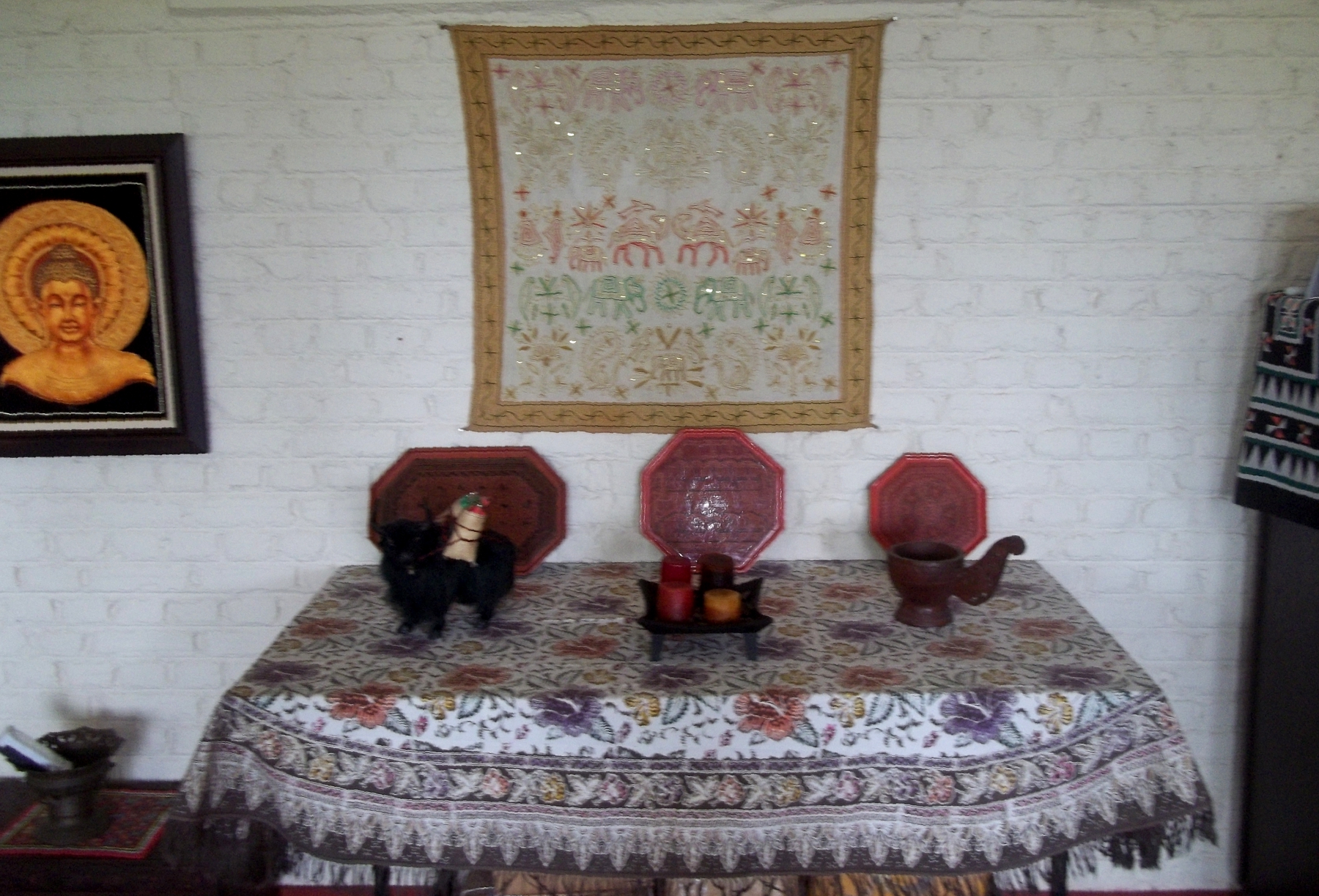 |
|
|
Hmong, Indonesia, Burma, Sri Lanka, Pakistan, Maranao
|
|
|
Lily in a sari from West Bengal
|
|
|
A new gate at Vajirarama
|
|
|
|
|
|
|
|
|
|
|
|
|
|
|
|
Back to Table of Contents

Buddhist Relief Mission
|
|
|
|





 Recently, in our class of monks and nuns at Subodharama, we read the Dhammapada story we call "
Recently, in our class of monks and nuns at Subodharama, we read the Dhammapada story we call "


 In September, Ewen invited us to the
In September, Ewen invited us to the  Thanks to Amal, we learned about a
Thanks to Amal, we learned about a 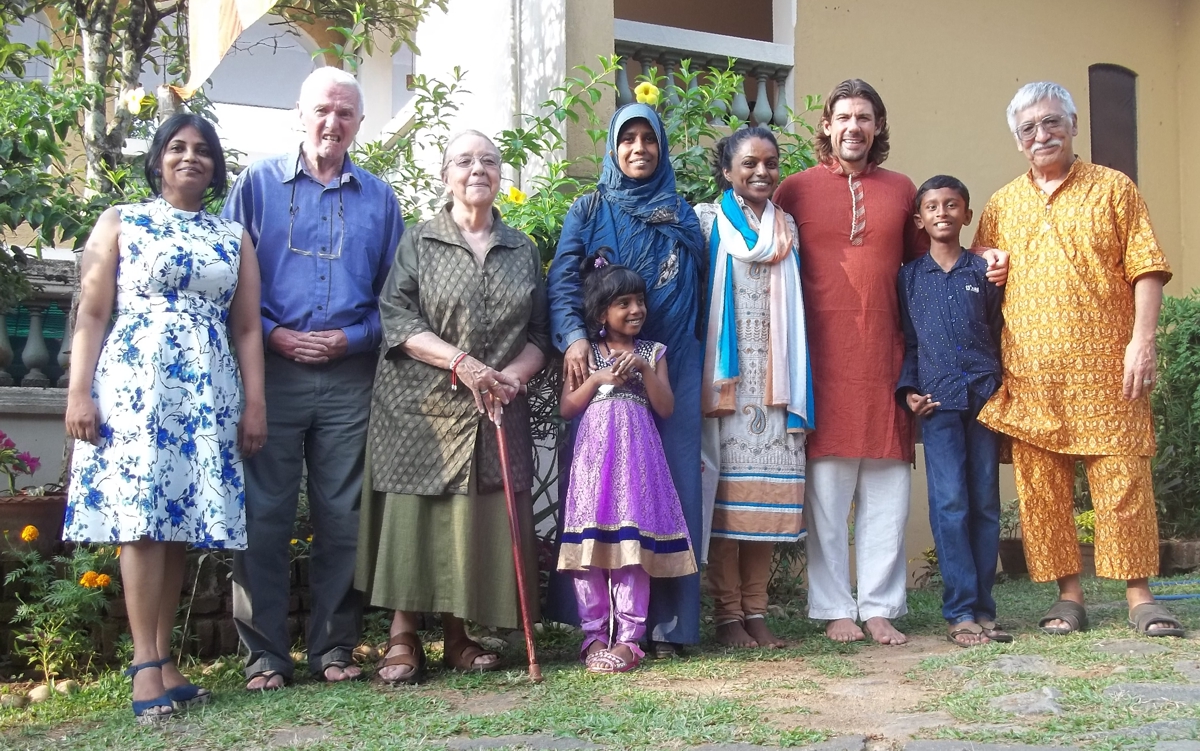
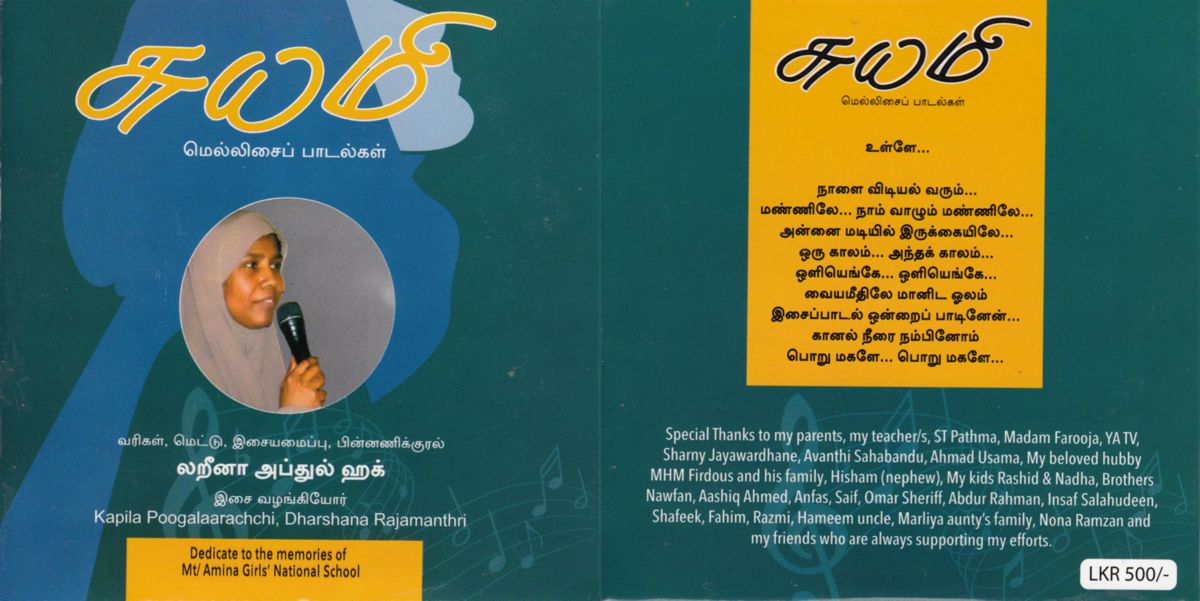
 The more we learn about the life and work of Dr. Bhimrao Ramji Ambedkar (April 14, 1891 - December 6, 1956), the more we understand why he is regarded as a Bodhisattva. A brilliant student, jurist, economist, politician and social reformer, he chaired the drafting committee of the Constituent Assembly and was India's first Minister for Law and Justice. He campaigned against social discrimination based on caste and actively supported the rights of minorities and labor. In 1956, he converted to Buddhism and continues to inspire the Dalit Buddhist Movement. Following his example, every year, millions of Dalits take refuge in the Triple Gem.
The more we learn about the life and work of Dr. Bhimrao Ramji Ambedkar (April 14, 1891 - December 6, 1956), the more we understand why he is regarded as a Bodhisattva. A brilliant student, jurist, economist, politician and social reformer, he chaired the drafting committee of the Constituent Assembly and was India's first Minister for Law and Justice. He campaigned against social discrimination based on caste and actively supported the rights of minorities and labor. In 1956, he converted to Buddhism and continues to inspire the Dalit Buddhist Movement. Following his example, every year, millions of Dalits take refuge in the Triple Gem.






 Last month, Lalitha insisted that we mark our calendars for Saturday, November 5. She was inviting us to the 75th Anniversary Meeting of the Sri Lanka Federation of University Women, Kandy. We knew nothing about this organization, and were not sure why we, particularly Ken, were invited. We were, nevertheless, happy to attend, because Lalitha is such a steadfast friend and everything she is involved with is exciting. We perused the schedule and tried to time our arrival after most of the business part of the meeting would be finished, but before the arrival of the special guest, who (we were happy to see) was the Assistant High Commissioner, whom we had met at the meeting mentioned above. We were a little early, and Lalitha (who is Vice-President of the organization) left the head table to greet us warmly, but quietly, and seated us prominently in the front row. At first, we felt a little embarrassed to be there for the official proceedings (Ken was the only man in attendance at that point), but no one seemed to mind. We were amazed at how civilly and succinctly the women carried out their business. In discussions, they listened carefully to each other, and no one tried to dominate with long-winded pontificating. It was a joy to watch the proceedings. One issue that particularly interested us was whether the organization was a branch of the Colombo organization or completely independent. We did not follow completely, but we thought we heard that the organization in Kandy is actually older than the one in Colombo. In that this is the 75th anniversary, we were not surprised. In her presentation to the group, Lalitha pointed out that, if the organization is, indeed, independent, a separate constitution is needed. She cited one article from the Colombo constitution and proposed her own revision, which stipulated that "any dedicated person" be eligible for membership. She glanced at Ken as she read that, and we understood that she hopes that we both will become members. We would be honored!
Last month, Lalitha insisted that we mark our calendars for Saturday, November 5. She was inviting us to the 75th Anniversary Meeting of the Sri Lanka Federation of University Women, Kandy. We knew nothing about this organization, and were not sure why we, particularly Ken, were invited. We were, nevertheless, happy to attend, because Lalitha is such a steadfast friend and everything she is involved with is exciting. We perused the schedule and tried to time our arrival after most of the business part of the meeting would be finished, but before the arrival of the special guest, who (we were happy to see) was the Assistant High Commissioner, whom we had met at the meeting mentioned above. We were a little early, and Lalitha (who is Vice-President of the organization) left the head table to greet us warmly, but quietly, and seated us prominently in the front row. At first, we felt a little embarrassed to be there for the official proceedings (Ken was the only man in attendance at that point), but no one seemed to mind. We were amazed at how civilly and succinctly the women carried out their business. In discussions, they listened carefully to each other, and no one tried to dominate with long-winded pontificating. It was a joy to watch the proceedings. One issue that particularly interested us was whether the organization was a branch of the Colombo organization or completely independent. We did not follow completely, but we thought we heard that the organization in Kandy is actually older than the one in Colombo. In that this is the 75th anniversary, we were not surprised. In her presentation to the group, Lalitha pointed out that, if the organization is, indeed, independent, a separate constitution is needed. She cited one article from the Colombo constitution and proposed her own revision, which stipulated that "any dedicated person" be eligible for membership. She glanced at Ken as she read that, and we understood that she hopes that we both will become members. We would be honored! The skit lasted only about ten minutes, but it was marvelous. These were probably only middle-school students, but their poise and self-confidence was astonishing. Every line of the dialog was given with perfect pronunciation and a degree of intonation that most Sri Lankans who have not had an English education can only dream of. Lalitha should have been extremely proud, but she gave all credit to the students and their own teacher. That's the kind of teacher she is!
The skit lasted only about ten minutes, but it was marvelous. These were probably only middle-school students, but their poise and self-confidence was astonishing. Every line of the dialog was given with perfect pronunciation and a degree of intonation that most Sri Lankans who have not had an English education can only dream of. Lalitha should have been extremely proud, but she gave all credit to the students and their own teacher. That's the kind of teacher she is! On October 6, Lore Kawasaki, the German-born wife of Ken's eldest brother Ed, passed away. She had been bed-ridden for about ten years as the result of a stroke. We visited her and Ed many times while we were living in Japan and before we came to Sri Lanka. She was lively, witty, and a lot of fun. That is how she will always be remembered.
On October 6, Lore Kawasaki, the German-born wife of Ken's eldest brother Ed, passed away. She had been bed-ridden for about ten years as the result of a stroke. We visited her and Ed many times while we were living in Japan and before we came to Sri Lanka. She was lively, witty, and a lot of fun. That is how she will always be remembered.






























